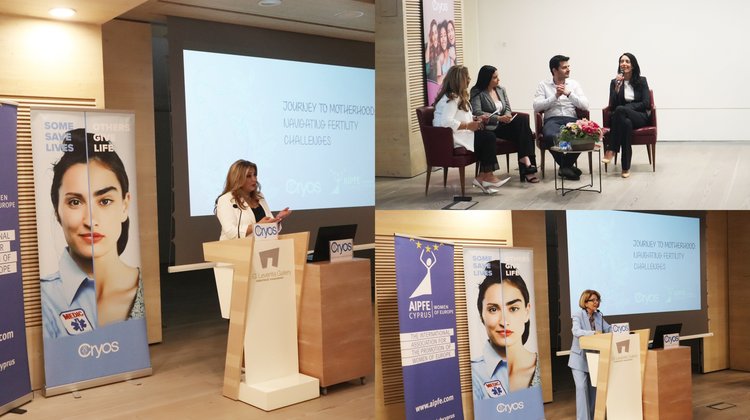Nicosia event examines fertility challenges in the journey to motherhood
07:22 - 19 May 2023

On the occasion of International Mother’s Day, Cryos International Cyprus and and AIPFE Cyprus - Women of Europe recently organised an informational event, titled ‘Journey to Motherhood – Navigating Fertility Challenges.
Held on 16 May at the A. G. Leventis Gallery in Nicosia, the event’s purpose was to inform women about fertility issues, the importance of their prevention, and the various options offered by science.
It was held under the auspices of Minister of Health, Dr Popi Kanari and included a presentation from Cryos International Cyprus’s Director of European Operations Saghar Kasiri, and a panel discussion by MP Savia Orphanidou, Obstetrician-Gynecologist Dr Anastasis Anastasiadis, as well as Sophia Paraskeva speaking from a patient’s perspective.
Addressing the event, the President of AIPFE Cyprus - Women of Europe, Despina Papadopoulou stated: “Nowadays, even in the closed and traditional community of Cyprus, infertility is fortunately no longer a taboo – We’ve come a long way in the last 15-20 years. Misconceptions about fertility and the different set-ups of a family unit are changing, and although many single mothers still face some challenges on their journey to motherhood, I am so happy to see cases where this journey becomes an example for others to follow.”
The Minister of Health emphasised that the availability, access, and quality of medical services provided for the treatment of infertility pose a challenge in modern countries. Additionally, she mentioned that the Ministry of Health has promoted contemporary legislation for assisted reproduction and subsidises treatments for infertility through an innovative program by providing grants for egg preservation with the aim of preserving fertility.
During her presentation, Kasiri, mentioned that according to the World Health Organisation, 15% of couples experience fertility problems that is either related to reproductive issues or caused by external factors such as age, smoking, stress, malnutrition etc. Around 48 million couples and 186 million singletons globally experience infertility.
Referring to treatments, Kasiri mentioned that in the last 40 years, over 8 million children had been born worldwide through assisted reproductive technology. Furthermore, egg and sperm donation is an effective option for couples who experience infertility thanks to gamete banks.
Explaining the importance of preserving fertility, either for medical or social reasons, Kasiri mentioned that sperm and egg freezing gives men and women the opportunity to have children later in life. She mentioned that Cyprus is the only country offering a to women over 35 years old to freeze their eggs for social reasons.
During the panel discussion, Dr Anastasiadis, mentioned that the most significant factor in infertility and the most challenging one to address is age, as the number and quality of eggs decrease over time. For this reason, the importance of timely informing women, a role in which gynecologists themselves play a crucial part, was emphasised.
On her part, Paraskeva shared her own experience with fertility and her egg freezing journey, mentioning that when she accidentally found out that her fertility was declining, she had to go through a very lonely and emotional experience, as she had never received proper information before or during the procedure. Later on, she found so many women dealing with the same problems, and for this reason she pointed out more awareness campaigns are needed.
During the panel discussion, Orphanidou mentioned that in the past she took the initiative to create an awareness campaign, having realised that there’s a lack of information about fertility issues. She emphasised that such a campaign should be initiated by the Ministry of Health to inform women about the option of preserving their fertility at an early stage. She also highlighted the importance of improving the grant scheme over the past three years to include single women, noting that the government grant serves as motivation for women. Furthermore, she suggested dropping the age limit of 35 for government grants regarding social egg freezing. Additionally, she stressed the significance of establishing a donor registry to prevent illegal donations and misunderstandings.
All participants in the discussion agreed on the importance of early education in schools for timely prevention of infertility issues.

